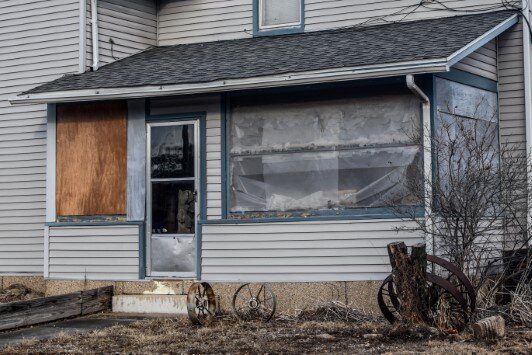
If you’re considering selling your house soon, you’ve likely considered the option of selling it as is.
And why not, right? Who wants to deal with the hassle of all those pesky repairs anyway? The thought of selling a house without lifting a finger sounds much better!
But in reality, selling as is is not the right solution for everyone, and there are trade-offs associated with it. For example, an as is sale generally comes with a lower sale price.
But exactly how much do you lose selling a house as is?
We’ve covered this question and more in this article. You will learn what an as is home sale entails and whether it is the right option for you.
Let’s dig in!
What Does As Is Mean in Real Estate?

Selling a house as is means selling it without the contractual obligation to repair any issues found by the buyer during their due diligence period. During the typical home sale process, the buyer has a set period to perform inspections and then submit a request for repairs to the seller. The seller must then respond to the repair request, and it becomes a negotiation to converge on a list of items the seller is willing to repair and the buyer is willing to accept.
Selling a home as is skips this entire process by setting the expectation up front that the seller is unwilling to make any repairs. Home sellers choose this route for many different options. Some houses need such major repairs that it is not feasible for the owners to fix every issue, while some elderly owners simply don’t want to be bothered with trivial repairs. Either way, selling a house as is simplifies the entire process and increases the likelihood of getting to the closing table.
Does As Is Mean No Inspections?
Even if a home sale is understood to be as is, the buyer is still entitled to inspect the property. However, in this case, any inspections performed are for reference only, and the buyer does not have the right to request the seller to make any repairs.
Just because a buyer and seller have agreed to an as is sale, that does not mean the buyer must purchase the house no matter what they find. If they uncover major defects during their inspection period, they can either reopen the negotiation on the sales price or walk away and recover their earnest money.
Does a Cash Offer Mean As-Is?
Technically, a cash offer does not mean that the sale will also be as is. All a cash offer means is that there is no financing contingency, meaning that the sale is not contingent upon the buyer’s ability to obtain financing from a bank. This can give sellers much greater assurance that the deal will go through, but it does not mean that the house will be sold as is unless stated in the purchase agreement.
That being said, most professional cash home buyers include both of these benefits in their offers. They pay all cash, and they buy homes as is. This is all to offer homeowners the easiest way to sell a house.
However, this association has created somewhat of a misconception in the public eye, because some retail home buyers purchase homes to live in with cash but still require a full inspection and ask for repairs to be made.
How Much Money Do You Lose Selling a Home As Is?

There are obvious benefits of selling a house as is – namely, the convenience of not having to worry about a punch list of repairs from the buyer. However, these benefits do come at a price.
But how much does selling as is affect the sales price of a home?
That depends on several factors. For example, is your home in good enough condition for an owner-occupant to buy it, or is a real estate investor your most likely buyer? Let’s look at these two scenarios since they will affect your bottom line when selling as is.
Selling to an Owner-Occupant
An owner-occupant buys a home to live in, as opposed to an investor that buys houses to either flip or rent out. In general, an owner-occupant is willing to pay more than an investor would since they’re just looking for a place to live at a reasonable price and are not necessarily concerned with turning a profit.
Many home sellers believe they can subtract the repair costs from their home’s after-repair value (ARV), and that will give the amount someone will be willing to pay for it. However, the selling price is typically a little lower than that because buyers feel they should get some sort of bargain because they are willing to put in some sweat equity. Otherwise, they would be better off buying a home that is already fixed up and skipping the hassle of making repairs and updates.
So how much of a discount can you expect when selling a house as is to an owner-occupant?
Here is a simple example: Let’s assume your home’s fair market value would be $250,000 if it were in prime condition based on other recently sold homes in the area. And let’s say it needs basic renovations totaling around $20,000. In this case, you might expect to sell as is to an owner-occupant for around $220,000. Keep in mind that agent fees and closing costs will get taken out of that number, so that isn’t the amount you will actually walk away with.
Selling to a Real Estate Investor
While selling as is to an owner-occupant might make you more money, it isn’t always feasible. Most potential buyers are only willing to make light repairs, and anything more than that will deter most of them.
If your home needs significant repairs, a real estate investor will likely be your best option. Investors are used to completing major overhauls on houses and typically have teams of contractors that can easily handle them.
Since a professional cash home buyer purchases homes to turn a profit, they calculate offers slightly differently than an owner-occupant. They typically start by determining the ARV of the property, which is what it will be worth once it is fixed up. Next, they determine the expenses they will incur from renovating the house and getting it sold. The most common expenses are repair costs, holding costs, closing costs, and real estate agent fees. Next, they subtract these expenses and their desired profit from the ARV to determine how much they can pay for the property.
Here is a quick example of a property we recently purchased as is. The estimated ARV was around $270,000, and it needed about $15,000 in repairs and updates. We bought the house for $212,000. Keep in mind that the seller paid zero agent fees or closing costs.
Now, if you only subtract the purchase price and rehab cost from the ARV, it would appear that we made a tremendous profit. However, that calculation doesn’t account for the other expenses we incurred. The profit margin becomes significantly smaller when you factor in real estate agent commissions, closing costs, and holding costs associated with our financing.
You Might Lose Less Money Than You Think
It’s true; you can likely make more money by remodeling your house than you would from an as is sale. However, you must decide if a complete remodel is something you want to take on. Sometimes the money you lose selling a house as is is worth it when you consider the time and effort it will take to get it in prime, list-ready condition.
Also, in the dozens of homes we’ve remodeled, we’ve learned that nearly every renovation project goes well over budget and schedule. Many homeowners calculate the difference between what their home is worth as is and the listing price if it were fixed up and elect to make the repairs themselves. However, it is common for them to underestimate the cost of the project and grossly underestimate the timeline, which plays into the true cost of renovating a house.
When you look at the bottom line, the net money you walk away with between selling as is and making repairs yourself is often closer than you think. In some cases as is sellers make even more. But it often comes down to whether you’re willing to put in the effort and go through the hassle of making repairs to squeeze out as much money as possible from your home or prefer the ease of an as is sale.

Factors That Affect How Much You Lose Selling a House As Is
How do you make the right choice when deciding whether or not to sell your home as is? In some cases, selling a house as is can cost you tens of thousands of dollars. Other times, as is home sales end up making the sellers more money than if they were to fix up the house. Let’s look at the factors that affect how much money you lose with an as is home sale.
The Local Market
Your local market can play a tremendous role in how much money you lose selling your home as is. For example, the last two years have been a sharp seller’s market, allowing homeowners to get away with deferred maintenance when selling their homes and still receive close to market value.
In market conditions as we’ve seen recently, it might not make sense to fix up your home before selling it. In fact, selling it as is could fetch you more money. The key is to look at other houses that have sold and group them into two categories – those that sold in the same condition as yours and those that sold in tip-top shape. If the difference between the premium and as is home sales is less than what it would take to fix up your home, then it would be a no-brainer to list it as is.
However, in a market with fewer buyers and more homes on the market, you need to do everything you can to stand out from the competition, and an as is listing will not get you to the top of the list. You can still sell your house as is, but expect more of a price cut than you would see in a seller’s market.
Condition of the Home

Your decision on whether to repair your home or list it as is should also be based on its condition. If your home is already in pretty good shape and only has some minor issues that can be easily repaired, it typically makes sense to make those fixes before selling it. Listing it as is could deter many prospective buyers that would otherwise be thrilled to make an offer on your house, which might result in a sale well under your asking price.
However, if your home needs significant repairs, it generally won’t hurt you to list it as is. This is because your avatar buyer is likely a cash buyer who always purchases homes as is. Therefore, you won’t deter any potential buyers with an as is listing.
Price Point
Another deciding factor when considering selling your home as is is the price point you intend to sell it at. Generally, home buyers at higher price points are much pickier than those looking for more affordable homes. If you wish to sell your house at or above the median sales price for your local market, it likely makes sense to make the necessary repairs.
On the other hand, if you have a starter home and plan for your asking price to be well under the median sales price for your market, you’re much more likely to get away with selling it as is without losing much money.
Does it Hurt to List Your Home As Is?
Who wants to make repairs, right? The ease of selling your house without lifting a finger is enough to make everyone consider listing it as is.
However, listing your house as is can backfire. One case where this doesn’t make sense is a house near or above your area’s median price point and is already in good condition. Even though selling it without having to worry about repairs sounds nice, you should resist the urge.
And this doesn’t mean that you have to make repairs! It just means you shouldn’t list it as is. Listing your home as is will undoubtedly turn away many potential buyers because they automatically assume something is wrong with it – even if it is perfectly fine in your case!
Instead of listing it as is, you should list it at a competitive price. This will get an abundance of buyers in the door and will likely result in multiple offers. You can then choose which offer makes the most sense to you based on the purchase price and the contingencies. And remember, you can always negotiate away the inspection contingency – especially if you’re in a multiple-offer situation.
Will You Lose Money Selling Your House As Is?
The truth is, it depends. Unfortunately, there is no magic formula that tells you exactly how much you lose selling a house as is. Sometimes it can be a hefty amount, while other times you can lose money by making repairs.
We hope the information we’ve shared has provided some clarity on the decision of whether or not to sell your home as is. It can be a complicated decision, but if you apply the principles here, you’ll be well on your way to getting the most money possible.
